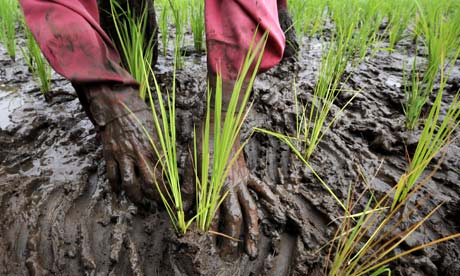Rising food and oil prices are biggest threat to recovery, says World Bank
World Bank forecasts slowdown in global growth as rising commodity prices hit poorest nations

High food prices are the biggest threat to economic recovery in poor countries, says the World Bank. Above, Indonesian paddy field. Photograph: Romeo Gacad/AFP/Getty Images
A fresh surge in oil prices and a rise in the cost of food pose the biggest threats to the recovery of poor countries from the global recession of 2008 and 2009, according to the World Bank.
In its latest economic health check, the Washington-based Bank said tougher economic policies and the jump in commodity prices would slow the pace of world growth this year before a pick-up in activity in 2012.
"Although solid growth led by developing countries is the most likely outcome going forward," the Bank said in its Global Economic Prospects, "high food prices, possible additional oil-price spikes, and lingering post-crisis difficulties in high-income countries pose downside risks."
The Bank predicted that global growth was on course to edge down from 3.8% in 2010 to 3.2% this year, then accelerate to 3.6% in 2012. It forecast that the pace of activity in high-income countries would slow from 2.7% in 2011 to 2.2% in 2012. Developing countries, which were responsible for almost half global growth in 2010, would expand by 6.3% this year, down from 7.3% in 2010.
The Bank warned that its forecasts could be over-optimistic should oil prices continue to rise. Brent crude was trading at $115 a barrel in London on Tuesday ahead of a meeting of the Opec oil cartel in Vienna, and Justin Yifu Lin, the Bank's chief economist, said: "Further increases in already high oil and food prices could significantly curb economic growth and hurt the poor."
The Bank believes that a further, permanent increase in oil prices caused either by increased uncertainty or because of supply disruptions could reduce global growth by 0.5%.
The report said developing countries had proved resilient despite tensions in high-income countries but that they now needed to focus on structural reforms and take action to combat inflationary pressures.
"Many developing countries are operating above capacity and are at risk of overheating, most notably in Asia and Latin America," said Hans Timmer, the Bank's director of development prospects. He said countries might need to tighten fiscal policy or allow their exchange rates to appreciate to keep inflation in check.
The Bank said high oil prices and production shortfalls caused by bad weather had led to higher food prices. Poor people, who spend a high proportion of their income on food, had been particularly hard hit. "A poor harvest during the 2011/12 crop year, or a second substantial increase in oil prices, could cause domestic food prices in developing countries to rise much higher, with dire consequences for poverty," the Bank said.
(source:.guardian.co.uk/business/2011/jun/08)
==============================================
No comments:
Post a Comment